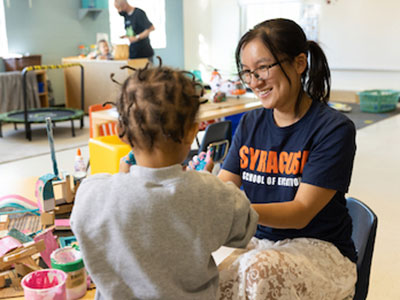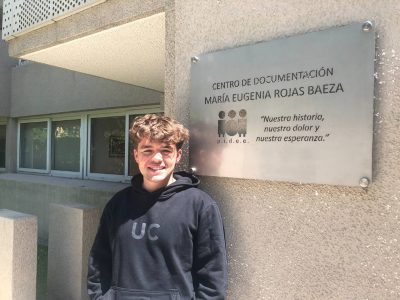Emily Liu G'22 Hones Skills in Inclusive Education, Classroom Leadership at Jowonio School
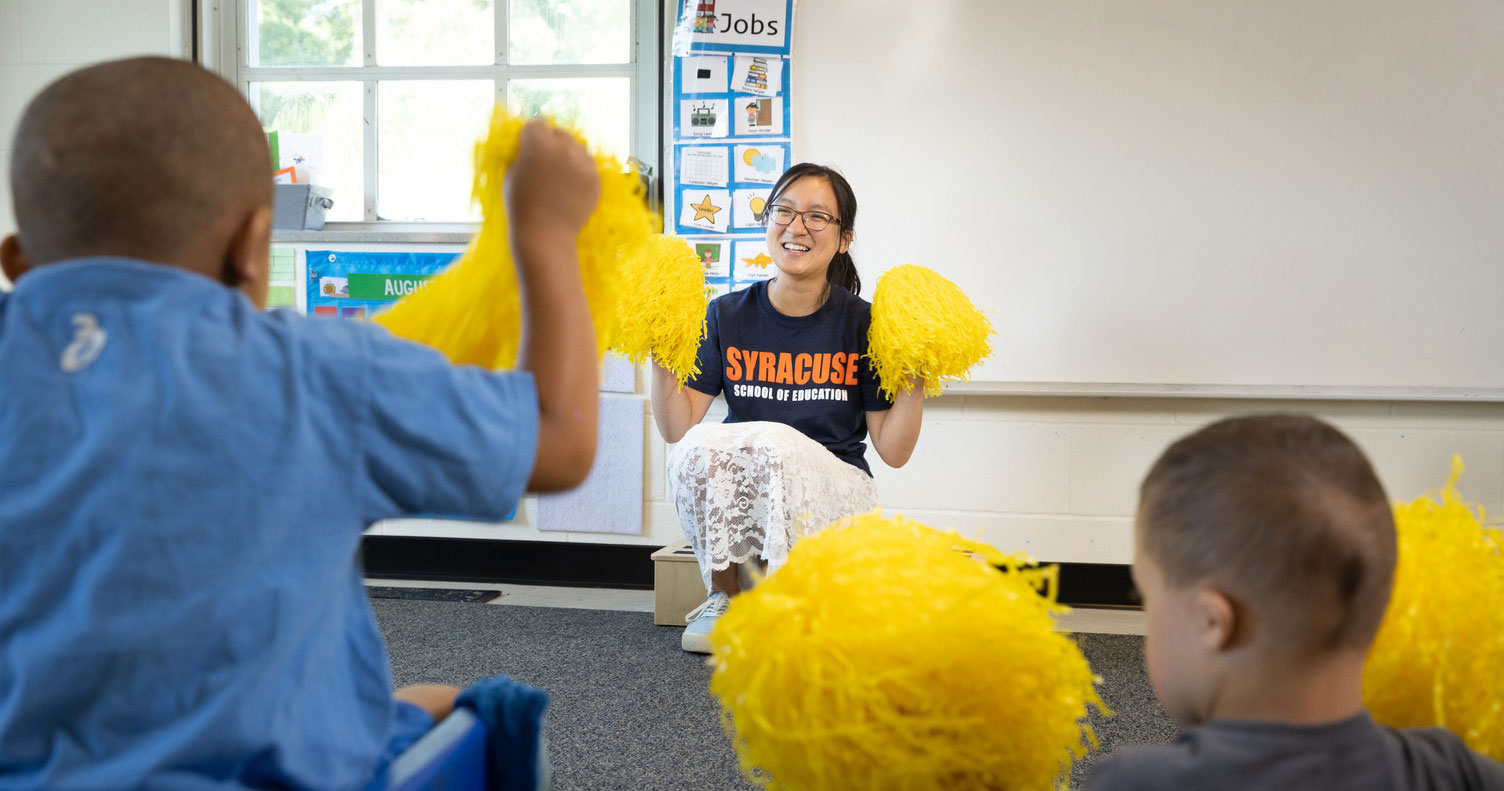
The ink was barely dry on her master’s degree diploma when Emily Liu G’22 began prepping her new classroom at Bernice M. Wright School, an early childhood education program on the Syracuse University campus.
Having graduated only a couple of weeks earlier in August 2022 with a master’s in early childhood special education, Liu is now responsible both for teaching her toddler students and supervising her first teaching assistant. “I’m both excited and nervous, but I will use a lot of strategies I learned at Jowonio School,” says Liu.
If Liu sharpened her teaching and leadership skills in her master’s degree courses, it was at her summer guided teaching placement where those skills were honed, giving her an edge as she takes the lead in her own classroom.
Legendary School
“Jowonio is a legendary school,” says Thomas Bull, assistant teaching professor and School of Education (SOE) director of field relations. “It’s one of the originators of pre-school inclusive education, and many of the practices you see there are the basis of what is taught at the School of Education.” Founded in 1969 in Syracuse’s near East side, Jowonio School—the name means “to set free” in the language of the Onondaga Nation, whose ancestral lands encompass the city—is an alternative pre-school that practices full inclusion of students with disabilities.
Fellow SOE alumna, Allison Fuess G’19, mentored Liu during her placement. A former SOE student teacher at Jowonio herself, Fuess began welcoming student teachers to her classroom from day one. “Jowonio threw me right into mentoring,” says Fuess. “A lot of Syracuse students come through our school, and it’s wonderful. I felt privileged to move into the role of lead teacher and mentor. I’m proud to be involved.”
According to Fuess, Jowonio’s philosophy is that every child should have equal access to learning and equal opportunities to grow.
“There is no reason a child who uses a wheelchair should not have access to outside space or sports activities,” she says. “We make sure every child is included in everything. That means lots of adaptation all the time, but it gives our students an amazing outlook on life. They realize there is no reason any child shouldn’t be treated as equal and with respect. It’s really cool to see in action.”
Truly Inclusive
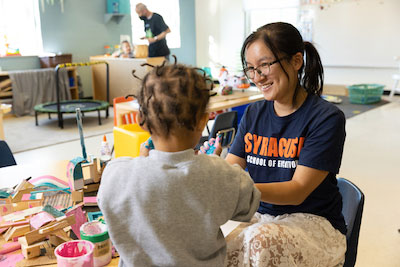
Typically, Jowonio classrooms serve around a dozen children during the regular school year, and between five and eight during the summer. During her summer placement, Liu took on different roles as she learned both classroom management and how to serve each student’s unique needs.
“Emily was my teaching aide, learning about the lead teacher role and covering some of the administrative work to make sure things went smoothly,” says Fuess. As part of her SOE coursework, Liu also developed lesson plans, with Fuess offering feedback. “Emily had independence in the classroom within Syracuse program requirements and especially when interacting with students.”
“Summer lessons revolved around themes of weather, monsters, and transportation,” says Liu. “It was a lot of fun. I designed lessons on these themes that targeted a wide range of developmental domains, including physical development, social and emotional development, communicative development, and cognitive development.”
“Every kid had a different needs profile,” she continues, “so I needed to offer the right accommodations so each child could learn. I learned a lot about providing accommodations and modifications during my time at Jowonio. Not only did I have support from my professors, I felt well supported by my mentor.”
Although not every school supports students with disabilities in the way Jowonio does, Bull says it’s important for Syracuse students to understand what an effective inclusive teaching space can look like. That is part of the reason why the SOE and Jowonio have worked together on guided field placements since the 1980s.
“I tell our students that although this is a pre-school school setting, everything you want to see in a truly inclusive space is being done here,” Bull says. “It’s a place of structure and support based on the idea that everyone belongs. That means individualized support, building community, responding to students’ needs, creating accessible spaces, and fostering collaboration among the teachers and providers in the classroom.”
Working Together Seamlessly
That last element—collaborative teaching—is a critical piece of what Syracuse’s student teachers experience in this immersive placement. “It’s a key component of what our students learn—how to purposefully and successfully work with other adults in an inclusive space,” says Bull.
“In my classroom half of the students have some kind of disability or developmental need,” says Fuess. “Because of that, we have a lot of adult help—a lead teacher, special needs assistants, a teaching assistant and a teaching aide. That’s a lot of adults, but it’s due to the structure.”
With as many as six adults in the classroom, students receive plenty of one-on-one time, with teachers and aides rotating among them. As part of her duties, Liu worked closely with individual students and led small learning groups.
“My biggest takeaway was seeing how well the adults can work together seamlessly. Sometimes without even exchanging words, everyone knew their role and where they needed to be in the moment,” says Liu. “That’s a great benefit to the kids. They have equal time with the teachers, and every child has their needs met.”
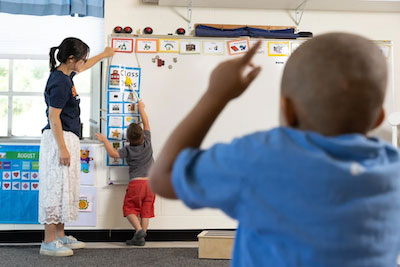
Offering her assessment of how Fuess managed her classroom aides, Liu says, “Ally was open-minded as she led her team. She let us bring new ideas and offer new lessons, and she gave us feedback based on her knowledge and understanding of her students.”
“This kind of inclusion is not always easy in a larger school district,” says Fuess. Nonetheless, she observes, the more that student teachers observe and practice in classrooms such as hers, so the philosophy and methods of full inclusion will spread.
“I believe getting this perspective as a student teacher makes you want to try different ways of making inclusion work,” Fuess says. “It’s a great perspective to give a young teacher—showing them that inclusion can happen.”
Learn more about the School of Education’s teacher preparation master’s degree programs and field placements and internships.
